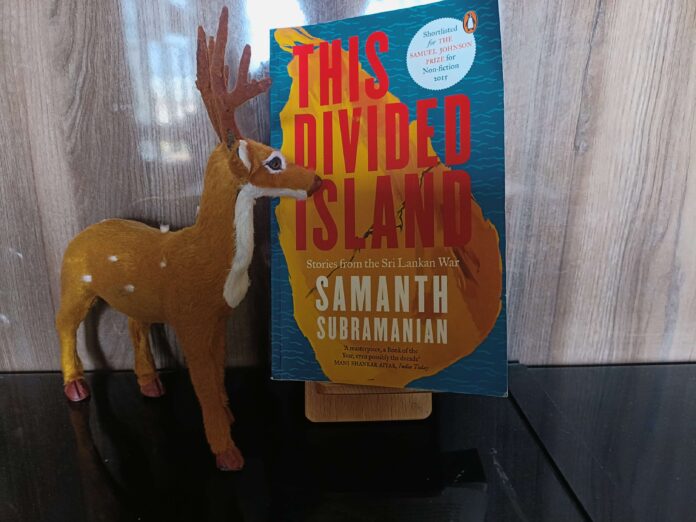Book Name: This Divided Island
Author: Samanth Subramanian
Rating: 5 ⭐
Family Man 2 was a well-made OTT thriller and like many others of the same genre kept me captivated while I watched it. But, I saw it way back in 2021. Why am I discussing it now? Because as a by-product of my curiosity regarding Raji – one of the protagonists of the show, led me pursue about civil war in Sri Lanka. After some research, I bought the book This Divided Island by Samanth Subramanian. I knew a little from news and other sources about LTTE, Prabhakaran, and the continuous political rancor in the neighboring country. This book bared it all. The book was languishing on my bookshelf for the last 20 months and I regret that. This is a must-read. For the last two days, I was sucked inside a hollow of despair after reading.
At the onset let me clarify, even if you are not interested in Sri Lankan history you should read this book just to explore the corridors through the inhumanity of humans.
Discussing the divided Island
The best part of the book is its balance. Divided into 4 main parts Subramanian starts with a timeline of the important events and dissects the terror unleashed through painful conversations with the people of Sri Lanka. The first part called “The Terror” forms the perfect preface to the mind-boggling ride. The next part “The North” focuses on the atrocities of the ambush. The third part “The Faith” is an interesting look at nationalist propaganda of the Sinhalese weaponizing words of ancient texts, convoluting certain truths in the process. The final part, “The Endgame” was heart-breaking. The war is long over but the destruction looms all over the state. The endless wait of the family members, and the displacement of homes and near ones, stay back as a lump in the throat of the readers, with a feeling of sheer despondency.
“In the wretchedness stakes of post-war Sri Lanka, there was always somebody worse off. Even hitting rock bottom was difficult because it was so thickly carpeted by the dead.”.
An unbiased and balanced prose
Extensively researched, this book skilfully walks on the tightrope of unbiasedness. It narrated the complete history (political and people’s) of the racial tensions in Sri Lanka and the civil war and ethnic cleansings it led to. But, not for a single line the writer showed his preference for any side of the battlefield fought between the Lions and the Tigers of the war-torn country.
In the very first chapter, someone comments, “The problem with the Tigers was that they fought their war based on language. That was a mistake because language isn’t a unifying enough force. These struggles are better organized around religion.”
But as I read through it was clear religion was always there. The cause and the effect. When the writer narrated the conversion with Sobitha a monk and a politician, a member of a party called JHU, and formed his arguments around killing Tamils with a metaphor of killing mad animals harming innocent humans I could not help but find a parallel to a certain similar discussion in our own country and similar radical groups
Shrink the humanity of your enemy, and the fighting must seem easier, more just, less complicated. Warfare consists of several psychological tricks, not least the ones you play upon yourself.
These words will stay with me for long.
While describing the Mahavamsa, a 6th-century chronicle of Sri Lanka, there is an episode postscript to the war that offers the most revelatory and startling commentary on Dutugemunu’s life. It perhaps traced the future of the island best.
It is a sad book nevertheless and at times gloomy without a solution. There were parts where I paused, stared into space, and just tried to digest what I just read.
The powerful quotes
This is a book I will keep going back to if not for anything, the powerful quotes.
Like this one,
Being a Tamil in the army, he said, was like being a bat. ‘Because the bat is a mammal, he goes and talks to the other mammals, and they say: “No, no, you’re a bird. Get out of here.” Then he goes to the birds, and they say: “No, no, you’re a mammal, you don’t lay eggs.
Being an unwanted minority in your motherland is an inexplicable pain. May this country also remembers that.
I felt a huge similarity with the Naxal uprising of the 70s in Bengal. The cause might not be wrong but the means of the fight never took off. And this quote just summarises it.
When the news of Prabhakaran’s death had broken, Raghavan had gotten drunk at home and wept complicated tears – for his comrades, for his estranged and cruel friend, for the vast toll of a campaign begun with mere black flags and Solignum graffiti, for the devastation of cause he still believed in, and for a fight that had somewhere gone very horribly wrong.
The verdict
The success of the book is the impartial way in which Subramanian writes, irrespective of whether he writes is about Prabhakaran or the president, Rajapakse. The simple, transparent prose forces the reader to engage and, brace the truth as it might be. The powerful prose makes it impossible to not get affected by the tragedy. I know I will keep going back to this book again and again. This I keep as a record of my first reading experience.
–X–
I’m participating in the #TBRChallenge by Blogchatter



